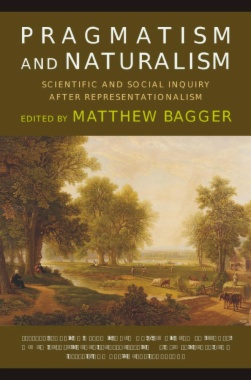Most contemporary philosophers would call themselves naturalists, yet there is little consensus on what naturalism entails. Long signifying the notion that science should inform philosophy, debates over naturalism often hinge on how broadly or narrowly the terms nature and science are defined. The founding figures of American Pragmatism—C. S. Peirce (1839–1914), William James (1842–1910), and John Dewey (1859–1952)—developed a distinctive variety of naturalism by rejecting reductive materialism and instead emphasizing social practices. Owing to this philosophical lineage, pragmatism has made original and insightful contributions to the study of religion as well as to political theory.
In Pragmatism and Naturalism, distinguished scholars examine pragmatism’s distinctive form of nonreductive naturalism and consider its merits for the study of religion, democratic theory, and as a general philosophical orientation. Nancy Frankenberry, Philip Kitcher, Wayne Proudfoot, Jeffrey Stout, and others evaluate the contribution pragmatism can make to a viable naturalism, explore what distinguishes pragmatic naturalism from other naturalisms on offer, and address the pertinence of pragmatic naturalism to methodological issues in the study of religion. In parts dedicated to historical pragmatists, pragmatism in the philosophy and the study of religion, and pragmatism and democracy, they display the enduring power and contemporary relevance of pragmatic naturalism.
- Table of Contents
- Acknowledgments
- Introduction, by Matthew C. Bagger
- Part I: The Classical Pragmatists and Naturalism
- 1. Instinct and Inquiry: A Reconsideration of Peirce’s Mature Religious Naturalism, by Michael L. Raposa
- 2. Religious Apologetic, Naturalism, and Inquiry in the Thought of William James, by Matthew C. Bagger
- 3. Deweyan Naturalism, by Philip Kitcher
- Part II: Pragmatism and the Study of Religion
- 4. Pragmatism, Naturalism, and Genealogy in the Study of Religion, by Wayne Proudfoot
- 5. Language, Method, and Pragmatism in the Study of Religion, by Scott Davis
- Part III: Pragmatism and Democracy
- 6. Reading Wayne Proudfoot’s Religious Experience: Naturalism and the Limits of Democratic Discourse, by Jonathon Kahn
- 7. Public Reason and Dialectical Pragmatism, by Jeffrey Stout
- Part IV: Pragmatism and the Philosophy of Religion
- 8. The Fate of Radical Empricism and the Future of Pragmatic Naturalism, by Nancy Frankenberry
- 9. Nonconceptualism and Religious Experience: Kant, Schleiermacher, Proudfoot, by Terry F. Godlove
- 10. The Oracle and the Inner Teacher: Piecemeal Naturalism, by James Wetzel
- Contributors
- Index

